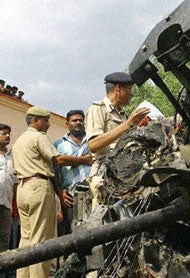Six die as armed militants storm disputed shrine

Five militants armed with grenades and assault rifles attacked the heavily guarded site of the former Babri mosque in Ayodhya, blowing a hole in the security wall with a Jeep packed with explosives.
Police killed all five in a gun battle that lasted nearly two hours. A sixth body found at the site is believed to be that of a man who triggered the blast. Although the police managed to prevent widespread carnage - there were Hindu pilgrims at the site at the time of the attack - the attempt alone was enough to inflame tensions.
The right-wing Bharati Janata Party (BJP), India's main opposition, called the incident an "attack on the Hindu faith". There were also concerns it could damage the peace process with Pakistan, after far-right Hindu parties accused Pakistani intelligence of being behind it.
There was no claim of responsibility but there were widespread assumptions that Isamic militants were behind the attack, which targeted a makeshift Hindu temple at the site. Some Indian media said Lashkar-e-Toiba, a militant group based in Pakistan, was responsible.
The Indian Prime Minister, Manmohan Singh, cancelled a tour of Gujarat, where 400,000 people have been made homeless by flooding, to hold an emergency cabinet meeting. Security forces were put on high alert against further attacks, and a tight guard was mounted around government buildings and major religious sites.
The Ayodhya site is a symbol of religious division every bit as potent for India as the disputed Temple Mount, or Haram al-Sharif, in Jerusalem, is for the Middle East. Until 13 years ago, it was the site of a 16th-century mosque. But many Hindus believe the mosque was built on the birthplace of Lord Ram, one of the most powerful Hindu gods.
In 1992, the mosque was torn to pieces by a mob of Hindu extremists who wanted to build a temple in its place. That incident set off riots which pitted Hindus against Muslims, in which more than 3,000 people died - the worst communal violence in India since partition in 1947.
And Ayodhya was involved in the explosive mix of events which set off new religious massacres in Gujarat in 2002, in which more than 2,000 people died. Those pogroms began after Hindu extremists who had visited the shrine were burnt to death in a train fire widely believed to have been started by Muslims.
The BJP called for nationwide protests today, and a general strike across Uttar Pradesh. In potentially inflammatory language, the party's leader, Lal Krishna Advani, said: "To attack the Ram Janbhoomi, the holiest shrine of the Hindus, is a very serious thing and there should be an equal reaction." But there were appeals for calm, with the Hindu nationalist umbrella group, the Rashtriya Shyamsevak Sangh (RSS), of which the BJP is part, urging Hindus to keep protests peaceful.
Muslim leaders also called for calm. "No movement can succeed with violence," a prominent Muslim scholar, Maulana Wahiuddin said. "They should give up the guns, bombs and violence and solve this through peaceful dialogue."
History of conflict
* JUNE 1984: Indian army storms the Sikh's Golden Temple in Amritsar, Punjab, after conflict with Sikh separatists, killing 1,000
* OCTOBER 1984: Prime Minister Indira Gandhi is assassinated by Sikh bodyguards. Nearly 40,000 people, mainly Sikhs, die in riots
* NOVEMBER 1989: Prime Minister Rajiv Gandhi allows Hindu ceremonies at Ayodhya site, leading to Hindu-Muslim riots that leave 600 dead
* MARCH 1990: Thirty hardline Hindus are killed by police storming the mosque at Ayodhya
* DECEMBER 1992: Militant Hindus gather at the Ayodhya mosque. Mobs raze it, and 3,000 people die in riots
* DECEMBER 2001: Fourteen people die in an attack on the Indian parliament, triggering a crackdown on Kashmiri Muslims
* MARCH 2002: Muslims burn 59 Hindu pilgrims to death on a train returning from Ayodhya. Up to 2,000 people, mostly Muslims, are killed in ensuing riots in Gujarat
Subscribe to Independent Premium to bookmark this article
Want to bookmark your favourite articles and stories to read or reference later? Start your Independent Premium subscription today.

Join our commenting forum
Join thought-provoking conversations, follow other Independent readers and see their replies